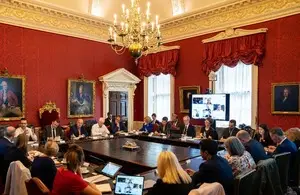Senior government ministers met with business leaders and trade unions to lay the foundation for what is being termed as a “new era of partnership”.
The meeting, held on 14th August 2024, aimed to address employment and workplace issues, contributing to the Labour party’s broader economic agenda.
A New Beginning
Business leadership organisations and trade unions met with senior government ministers to initiate what Deputy Prime Minister Angela Rayner described as a “new era of partnership”. The primary goal of this collaboration is to increase employment and enhance workplace rights and conditions.
In an unprecedented meeting on 14th August 2024, the parties resolved to “wipe the slate clean and begin a new relationship of respect and collaboration”. This is intended to support the Labour party’s economic growth plan.
Employment Rights Bill
The Employment Rights Bill was a focal point of discussion during the meeting. Participants shared their views on the bill, as well as on the broader Plan to Make Work Pay. Deputy PM Angela Rayner and Business Secretary Jonathan Reynolds listened attentively to attendees.
Since July’s election, Labour has revamped the remit of the Low Pay Commission to ensure early progress on the Make Work Pay plan. The Employment Rights Bill, featured in the King’s Speech, is expected to be introduced within 100 days of Labour taking office.
Key Provisions of the Bill
The bill includes various measures aimed at protecting workers’ rights. These measures include banning exploitative zero-hours contracts and ending the controversial practice of firing and rehiring employees.
Other significant provisions include introducing basic rights from day one, such as parental leave, sick pay, and protection against unfair dismissal. The bill also aims to strengthen the collective voice of workers through trade unions and establish a Single Enforcement Body to uphold employment rights.
Additionally, the bill seeks to ensure that the minimum wage is genuinely a living wage. This will be achieved by changing the remit of the Low Pay Commission to account for the cost of living and removing discriminatory age bands so that all adults qualify for the same minimum wage.
Government’s Commitment
Business Secretary Jonathan Reynolds emphasised the importance of this initiative. “For too long, the valuable insights of business and trade unions have been ignored by the Government, even on past decisions which have directly impacted them,” he stated.
He added that both business and workers would be instrumental in shaping the government’s ambitions, including the plan to Make Work Pay. This, he believes, will not only boost economic growth but also improve working conditions for everyone.
Trade Unions’ Perspective
Trade unions also expressed their views during the meeting. The unions present included GMB, TUC, USDAW, UNISON, Unite, and Prospect.
TUC General Secretary Paul Nowak highlighted the significance of the meeting, stating, “Today’s meeting was an important chance for unions and businesses to discuss the shared gains that the government’s reforms will bring, and we look forward to continued close working as ministers implement their plans.”
The general consensus among union representatives was one of cautious optimism, with hopes that the government’s reforms would lead to tangible improvements in workers’ rights and conditions.
Business Leaders’ Insights
Businesses were represented by various organisations, including the British Chambers of Commerce, Chartered Institute for Personnel and Development, Confederation of British Industry, Federation of Small Businesses, Institute of Directors, and Make UK.
Jonathan Geldart, Director General of the Institute of Directors, described the meeting as “an important first step in ensuring that there is meaningful dialogue with business”. However, he cautioned that a detailed engagement and consultation process is necessary to minimise the risk of unintended consequences from the proposed workplace reforms.
The meeting between businesses, trade unions, and government ministers marked a significant step towards fostering a collaborative approach to improving workplace conditions and economic growth.
With the Employment Rights Bill and the Plan to Make Work Pay at the forefront, this new partnership aims to create a more equitable and prosperous working environment for all. The various stakeholders will continue to work closely as these plans are implemented, ensuring that both business interests and workers’ rights are adequately represented.


